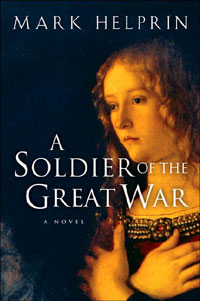|
|
||
|
The greatest book of all time?
aby Joe Foster A Soldier of the Great War by Mark Helprin. Harvest Books, 1991, 880 pages. have long considered A Soldier of the Great War the greatest book ever written. This is a debatable distinction, of course, but I happen to enjoy making sweeping and unprovable statements. In all honesty, though, I read this book once a year, and for a small time during and after, it changes me for the better. I notice the beautiful things more, and go out of my way to seek them out. Whether or not it deserves the distinction of being named , what better compliment to pay a work of art than to say that is makes you a better person when under its sway? Weighing in at a glorious 880 pages, reading it once a year is a labor of love; not so laborious considering that this is my mostest favoritest of all the books I’ve ever read in all my life. I have never come across anyone that writes as beautifully as Mark Helprin. A magic realist in the tradition of nobody else before him, he creates heroes who live as we all would like to: larger than life, confident, intelligently insane and beautiful. His characters speak the way people would speak if the world were perfect and everyone alive had a gift for verbal rhythm and metaphor. In a short story of Helprin’s, a man is in a museum and hears through a window a voice so beautiful that he had to see the person attached to it. He runs “like a merchant in pursuit of a thief” for the exit and is stopped and searched by the guards, who ask forgiveness but, “you have the air of someone who has stolen a painting – not to sell it, but out of love,” they say. Bah, but no one says such things in the real world, and it makes me sad. A Soldier of the Great War is about an Italian man, Alessandro Giuliani, a man with the soul of an artist, who goes to war. The great war in question is World War I. Growing up in Rome, Alessandro was a young man of such energy and life that he could make a horse rear up by willing it, the animal sensing and reacting to his energy. Rome is a city of light, and so Alessandro grows to appreciate this light and its power. Without light, all is darkness, but with it the world becomes beautiful. He eventually studies aesthetics, the study of beauty, or the study of the play of light. It’s this guy, this student of beauty, who eventually must go to war. Throughout all the atrocities that war feeds upon, Alessandro never loses this imperative, the world is always beautiful and wild and energetic. When young, Alessandro would travel quickly through a room or a crowded square, merely to create “friction.” Through all of his exploits, it feels as if he simply encounters differing degrees of friction, whether waiting for an attack from an assassin in the war’s highest alpine outpost, or working as a slave in the marble quarries, standing against a wall awaiting execution, or sitting still in a chair as a tropical storm rages overhead. Through love and loss, triumph and failure, Alessandro always sees the magnificence and energy of the world; even his own immense pain is a thing of immense beauty. The story rages all across Europe, from the sea to the highest peaks in the Alps with a cast of outrageous characters. From the decorated Russian commander who was secretly an active pacifist, to the crazed and spiteful clerk who secretly runs the war with intentional bungles and clerical errors, to the beautiful nurse whose skin would redden with excitement while treating Alessandro’s wounds, to the most handsome man in all of Italy, and his friend, the ugliest but happiest; they will all break your heart while strengthening your place in humanity. Helprin has received criticism for creating worlds too beautiful and characters too good. Such criticism invariably comes from bitter marmot-faced malcontents with lobster claws for hands and disquietingly bulgy giraffe legs who insist that the only art is that which makes us suffer. What, then, of the art that makes us rejoice and wonder at the lives we lead and the splendor that surrounds us? Art should reflect not only the grotesque, but the sublime, as well. Epic and gorgeous and magical, I promise you that this book will make you see afresh the beauty of the world around you, if only for a little while. •
|
In this week's issue...
- December 18, 2025
- Let it snow
Although ski areas across the West have taken a hit, there’s still hope
- December 18, 2025
- Look, but don't take
Lessons in pottery theft – and remorse – from SW Colorado
- December 11, 2025
- Big plans
Whole Foods, 270 apartments could be coming to Durango Mall parcel


